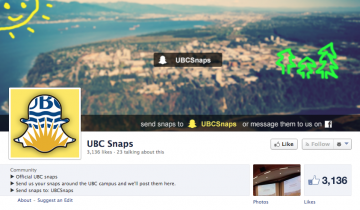If you’re a UBC student with a Facebook account, you’ve likely already perused the UBC Compliments and UBC Confessions pages, and perhaps even made an anonymous contribution of your own.
Given the exponential rise of Snapchat, a disappearing-photo sharing app, it is no surprise that UBC Snaps is the latest in a series of anonymous, community aggregated Facebook pages to pop up online. Since early March the page has garnered over 3000 likes, with nearly 300 screenshots of Snaps being submitted anonymously by UBC students. Common submissions include scenic shots of campus, stealthy lecture hall pictures, and countless hashtags expressing the woes of exam season. Like other UBC social media pages, including Sleepers of UBC, Overheard at UBC, and the #WhatWeShouldCallUBC tumblr, UBC Snaps is a public online forum that serves to build a sense of community by aggregating the shared experiences of strangers.
However, what are the implications of publicly sharing an otherwise private message? Speaking more broadly, what is the appeal of this “disappearing media”? And does anything online ever truly disappear?
The rise of Snapchat has been gargantuan. Boasting 400 million Snaps shared per day, the app has effectively surpassed Facebook in photo uploads. Social media gurus and sociologists alike have been quick comment on this new phenomenon. What is it about disappearing media that makes it so addictive?
In a world where we are constantly overloaded with new online content, the knowledge that a picture or video will disappear in a matter of seconds forces us to pay attention. The temporary nature of Snapchat also removes the pressure for every picture to appear posed and perfect. Unlike Facebook or Instagram posts that can be reviewed at anytime, Snapchats are not added to the online archive of your life. This renders these smartphone interactions more authentic, spontaneous and much less calculated than posts on other more permanent online forums.
Despite the perceived “disappearing” nature of this media, pages like UBC Snaps provide a stark reminder that nothing on the Internet is truly temporary, or private. While the fleeting nature of these pictures may lead us to let our guard down, especially when interacting with trusted friends, it remains important to stay educated about the privacy issues surrounding photo-sharing apps. Snapchat recently released a much-anticipated update, which includes both chatting and a Facetime-like video conferencing feature. Tech bloggers have expressed concern that these features make the app less private, and render it more difficult to monitor who has saved the media you have sent them. Many users were also outraged when a young forensics examiner discovered that supposedly deleted Snapchats could actually be retrieved relatively easily, and that Snapchat was quietly collecting information about its customers.
Next time you send that less-than-flattering selfie, remember: think before you snap!
Are you a Snapchat aficionado? How would you feel if one of your Snap masterpieces ended up as a public post visible to thousands of strangers? Let us know in the comments!

